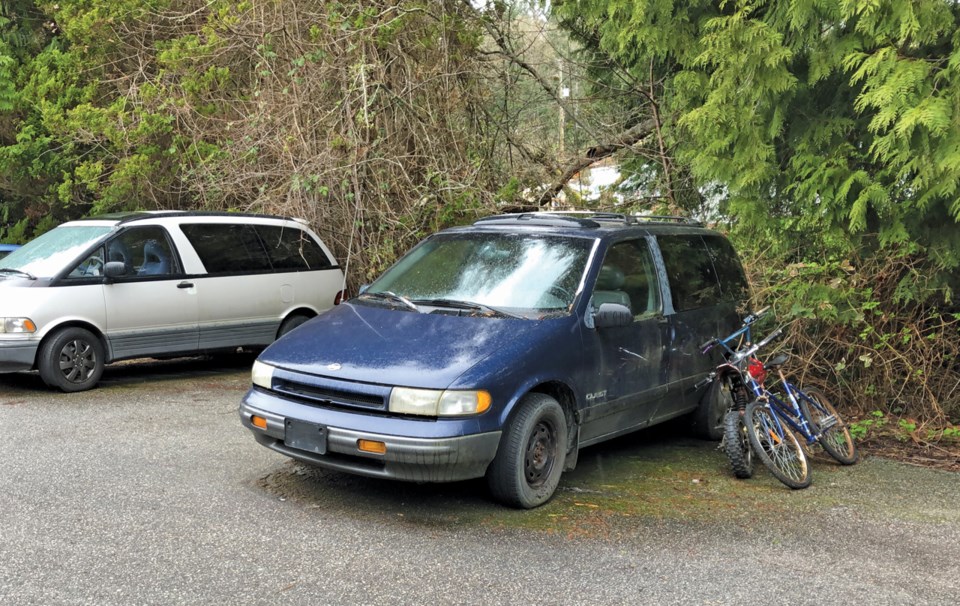When Brent Parker began speaking to Coast Reporter, he counted five boats parked in his Pender Harbour neighbourhood, all in various states of disrepair. One was a herring skiff without a motor, another was a 30-foot catamaran sitting on a trailer with the deck pulled off. Added to the mix were a few powerboats.
“It would be funny, except it’s happening to me, so I’m not seeing the humour,” Parker said.
Junked boats have been parked on rights-of-way outside his home and around his neighbourhood for months. One has been there since 2016. Parker has called the RCMP, the Ministry of Transportation and the Sunshine Coast Regional District (SCRD), but the problem isn’t going away.
Parker isn’t alone.
The waterways of the Sunshine Coast are not the only safe harbours for abandoned vessels. Rural area roads are littered with derelict boats, cars and paraphernalia of all sorts, from mopeds to trailers. They are also prime sites for nuisance parking – vehicles occupying several parking spaces in community hubs for weeks at a time; vehicles left for the summer near docks and boat launches, forcing other residents to walk long distances to get to their cars; vehicles blocking access for emergency responders.
To be sure, the municipalities of Gibsons and Sechelt face their own parking problems – of the 41 parking complaints the RCMP received since January, half to three quarters of them came from Gibsons – but it’s enforcement that’s the live issue for rural residents.
“People are just leaving their cars, taking the plates off and going away. We have three or four of those in the same prime spots. How do we handle that?” asked Leonard Lee, SCRD director for Pender Harbour, at a recent board meeting.
Those “prime spots” include the area’s four government docks, some of which are located in high traffic areas for pedestrians, cars and businesses. “It’s been an issue for quite awhile,” Lee told Coast Reporter. “You get people parking a trailer and truck longways, taking up five or six parking spots, and you can’t tow them, you can’t get them out of there.”
Parking on Ministry of Transportation rights-of-way is not illegal, according to the ministry, which is responsible for all roads outside the Town of Gibsons, District of Sechelt, shíshálh Nation and forest service roads.
Any abandoned vehicles that block traffic, get in the way of snow removal or present a safety hazard will be towed immediately. Otherwise, the ministry will work with its road maintenance contractor and the RCMP to track down the owner.
But just as with abandoned vessels that languish in jurisdictional grey zones, so too, do abandoned vehicles, since neither the RCMP nor the ministry have specific budgets for towing. “It’s almost like the derelict boats – who’s going to pay for the responsibility?” asked Sunshine Coast RCMP Const. Karen Whitby.
She said even tow companies can be hesitant to take cars with no known owners, since they can’t be sold and end up taking up space in their compounds.
To deal with vehicles simply parked for the summer season at the expense of businesses and pedestrians who frequent the areas, Pender Harbour Port Authority director Frank Mauro said signage could work, but that becomes a catch-22 since using signs to designate 24-hour parking or no parking zones forces the question of who cracks down on the recalcitrant parkers, something even the ministry admits. “It is not practical to place these on all ministry rights-of-way on the Sunshine Coast,” a spokesperson told Coast Reporter.
Lee would like to see stretches of rural roads fall under the SCRD’s jurisdiction specifically for parking so that SCRD bylaw officers can enforce the rules. That would be a practical solution, Lee said, since the SCRD already has a ticketing system in place. “We have the structure, we just don’t have the authority for parking,” he said.
Lee gave that idea a try last weekend at a regional government convention run by the Association of Vancouver Island and Coastal Communities (AVICC), where he introduced a resolution to ask provincial authorities to review the rules and give regional districts the power to enforce parking regulations within their boundaries, or to give rural detachments the resources to enforce.
Mauro made a similar attempt in 2014 when he was director for Pender Harbour. Back then the ministry responded, “further consultation and policy analysis may be required before considering the change.” This time, the resolution was endorsed and will move ahead to a larger convention hosted by the Union of BC Municipalities in September.
Meanwhile, Brent Parker and others like him will continue looking for solutions of their own, such as organizing groups to pay for towing.
While he doesn’t want a “battle” with the authorities or with problem parkers, his frustration persists, too. “Everybody is busy pointing their finger at everyone else and nobody gets anything done.”
During the interview with Coast Reporter, Parker watched as five boats turned into six. “I’m seeing another one being dragged into the neighbourhood,” he said. “[It’s] being parked right in front of the window.”



